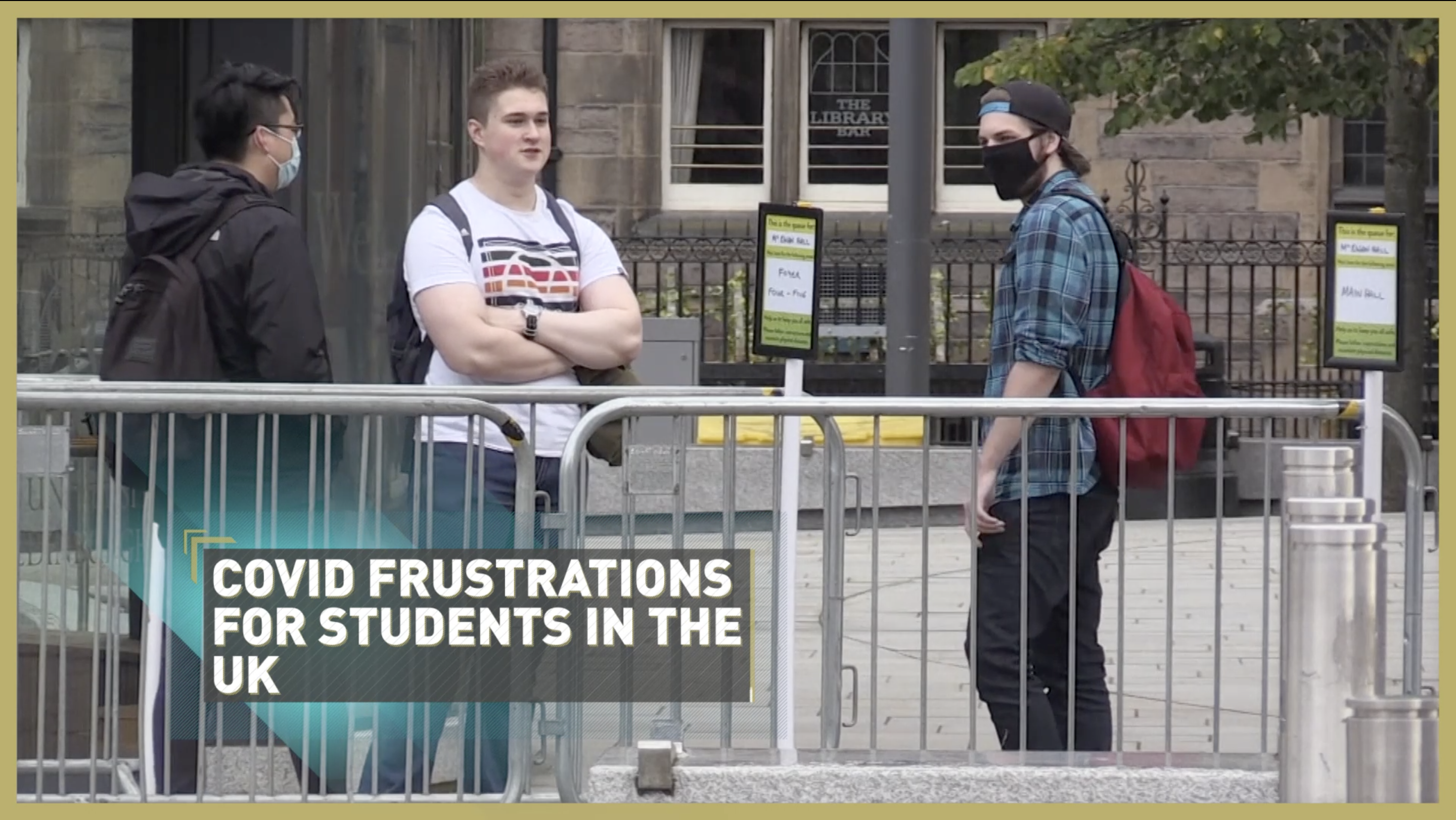02:42

Despite the COVID-19 pandemic, UK universities have seen an increase in student admissions this year. However, with hundreds of new infections, most colleges have had to curb the usual student experience of live lectures and socializing.
That's led to a number of complaints, and students in some universities are protesting about inadequate conditions and the lack of care for the mental wellbeing of their students.
"It's been ridiculous, it feels a bit like fever dream here – a little bit like we're in prison," says Tess Bailie, a first-year student at Edinburgh University, one of the UK colleges hit hardest by the virus. "Sometimes we feel like naughty boarding school kids."

The college authorities have set up systems to allow students to attend university, but with strict regulations to avoid spreading the virus.
"They hand out fines willy-nilly," says Bailie. "I don't think they really realize the weight of these fines, that we are students without a lot of money."
As an 18-year-old fresher (first year student) caught in the middle of a pandemic, she says, "it's really unfair and quite scary."
Is it worth it?
For weeks students have been complaining about feeling isolated, receiving unsuitable food, not being allowed out to exercise and having to study while being mostly stuck in their rooms.
At Bailie's university, up to 500 students living in campus accommodation at Pollock Halls have been in isolation after testing positive for the coronavirus, leading them to form a campaign group called 'Pollock Prisoner' to protest against what they deem unacceptable conditions.
And with tuition and accommodation fees easily costing on average more than $20,000 a year, many like Bailie are questioning if their university experience is worth it.
"I don't think we're getting value for money at all," she says. "If you compare our experience say to two years ago, we're all paying the same amount of money and we're getting the polar opposite experience. What we are receiving is a shell of what we thought we'd paid for."

Tess Bailie, a first-year student at Edinburgh University, says that many of the lectures she's receiving are pre-recorded. /CGTN Europe
Tess Bailie, a first-year student at Edinburgh University, says that many of the lectures she's receiving are pre-recorded. /CGTN Europe
Whether you have online lectures and in-person tutorials depends on which course you follow. In Bailie's economics course, she has one live tutorial each week, but in her politics class, the students only get recorded lectures.
Edinburgh University's communication department did not answer specific allegations made by students, but released a statement saying that students were receiving "a hybrid learning experience in line with Scottish Government guidance, where some in-person teaching takes place on-campus where it is possible and safe to do so."
They add that the university is delivering more than 95,000 hours of teaching this semester, saying "more than 35,000 hours of this is scheduled to be on campus."
However, Bailie is adamant this isn't the case: "They've told the press we are getting hybrid learning, and we're not.
"The online [courses] are not even live most of the time, and all the lectures are pre-recorded videos. I don't understand why they can't be on Zoom."
Mental health amid a pandemic
Many students are away from home for the first time and feel vulnerable. Some ask why universities were opened at all if infections were bound to increase.
And with the pandemic forcing universities to change from being open, social societies to lonelier and even intimidating places for some, the virus is taking its toll on many students' emotional wellbeing.
Jake Mills founded the mental health charity Chasing the Stigma in Liverpool seven years ago. He says there's been a significant increase in people, including students, getting in contact.
"Quite simply, [they ask] 'how do I get help, where do I go' – and this is a significant problem that we have, not just locally, but right across the world," says Mills.

The virus is taking its toll on many students' emotional wellbeing. /Joe Klamar/AFP
The virus is taking its toll on many students' emotional wellbeing. /Joe Klamar/AFP
"People right now, particularly students, are feeling isolated, completely alone, left in these situations without any hope," he adds. "They don't know where to go, where to turn to, they don't know what's available – and that's what we're trying to change."
Edinburgh University's statement concedes that "this is a very challenging time for our students," and adds that students can access a range of support including daily check-ins, pastoral care and a helpline.
However, the university maintains that despite the huge impact of the pandemic, "we want to reassure our students that a degree from Edinburgh will be as valuable as it has been for more than 400 years."
Bailie, though, is unconvinced: "They're profiting off a bunch a students who are just trying to get by and trying to get an education in the middle of a pandemic."